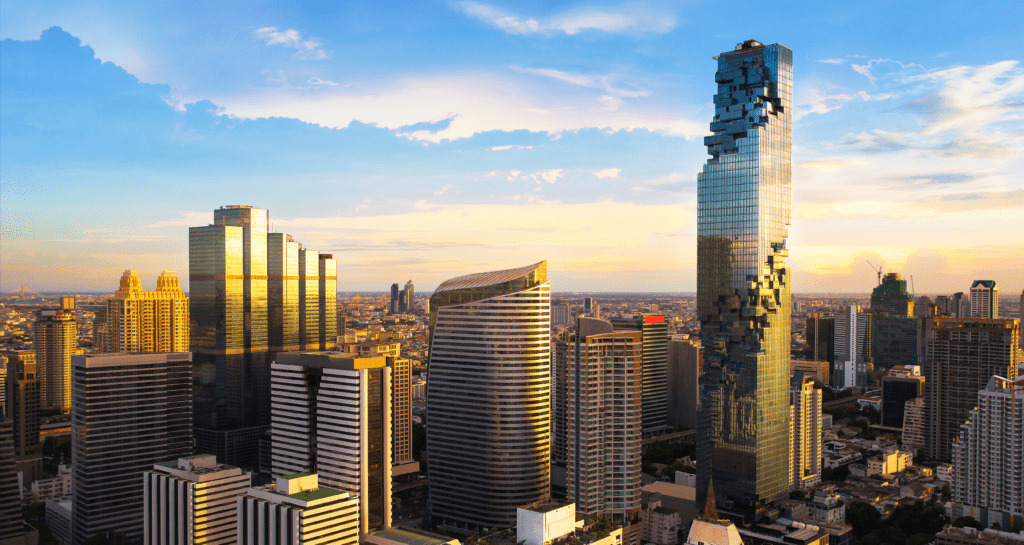Welcome to The Expat’s Guide to the Bangkok Property Market: How to Find Your Dream Home! This comprehensive guide is designed to help expats navigate the Bangkok property market and find their dream home. We will cover everything from understanding the different types of properties available, to navigating the legal process of buying property in Bangkok, to finding the right location and securing the best deal. We will also provide tips and resources for financing, budgeting, and managing your property, as well as information on tax implications and regulations for foreign property ownership. Additionally, we will discuss common challenges and pitfalls to avoid, as well as resources and support networks for expat property buyers in Bangkok. We hope that this guide will serve as a valuable resource for expats looking to purchase a property in Bangkok.
Table of Contents
Introduction to the Bangkok Property Market
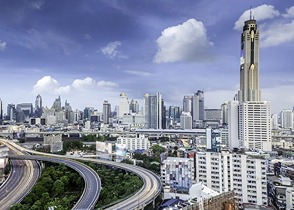
Bangkok, the capital city of Thailand, is a popular destination for expats looking to relocate or invest in property. The city boasts a diverse range of properties, from modern high-rise condos to traditional Thai-style homes, making it a great option for expats with different needs and preferences. The property market in Bangkok is also relatively affordable compared to other major cities in Southeast Asia, making it an attractive option for those on a budget.
The Bangkok property market has seen steady growth in recent years, driven by a growing population, increasing foreign investment, and a strong economy. This has led to an increase in the development of new properties and the revitalization of older neighborhoods. However, the market is also known for its volatility, and it is important for expats to be well-informed before making a property purchase.
The Bangkok property market offers a variety of options, from luxury high-rise condos to affordable apartments and houses. The city is also known for its vibrant street life, rich culture, and delicious food, which makes it an attractive option for expats looking for a unique and exciting lifestyle.
Overall, the Bangkok property market offers a wide range of options for expats looking to purchase or rent a property, and it is a great place for those who want to experience the culture and lifestyle of one of Southeast Asia’s most vibrant cities. However, it is also important to navigate the legal and financial aspects of the market, and to be well-informed in order to make a smart investment.
Additionally, it is important to note that the Bangkok property market is generally divided into two areas: the central business district (CBD) and the surrounding areas. The CBD, also known as the “Silom-Sathon” area, is home to many of the city’s major business and financial centers, as well as luxury high-rise condos and apartments. This area is popular among expats working in the financial and business sectors, as well as those looking for a more urban lifestyle.
On the other hand, the surrounding areas, such as Sukhumvit, Phrom Phong, and Thonglor, are known for their more residential feel and offer a wide range of properties from modern condos to traditional Thai-style houses. These areas are popular among expats looking for a quieter, more suburban lifestyle, and are known for their great food, shopping, and entertainment options.
It is also important to be aware of the different regulations and requirements for foreign property ownership in Bangkok. Thailand has specific laws in place that govern foreign property ownership, and it is important to work with a reputable lawyer or real estate agent who can guide you through the process.
In conclusion, the Bangkok property market offers a diverse range of options for expats looking to purchase or rent a property. It is a vibrant and exciting city with a unique culture and lifestyle, and offers affordable prices compared to other major cities in Southeast Asia. However, it is important to be well-informed and navigate the legal and financial aspects of the market in order to make a smart investment.
Understanding the Different Types of Properties Available
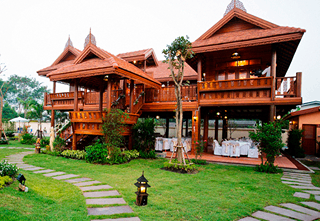
When it comes to the Bangkok property market, there are a variety of different types of properties available to suit the needs and preferences of expats. These include:
- High-Rise Condos: These are modern, high-rise buildings that offer luxury living with amenities such as swimming pools, gyms, and 24-hour security. High-rise condos are popular among expats working in the financial and business sectors and those looking for a more urban lifestyle.
- Apartments: These are multi-unit buildings that offer more affordable options for expats on a budget. Apartments are typically smaller than condos and may not have as many amenities, but they are still a great option for those looking for a more urban lifestyle.
- Houses: These are standalone homes that offer more space and privacy than condos or apartments. Houses are popular among expats looking for a quieter, more suburban lifestyle and are known for their great food, shopping, and entertainment options.
- Townhouses: These are multi-level, attached homes that offer a balance of space and privacy. Townhouses are popular among expats looking for a more suburban lifestyle and are known for their great food, shopping, and entertainment options.
- Traditional Thai-Style Homes: These are homes that are built in the traditional Thai architectural style and offer a unique and authentic experience of Thai culture. These homes are popular among expats looking for a more cultural and authentic experience in Bangkok.
It is important to note that properties in Bangkok can vary greatly in terms of price and quality, so it is important to do your research and work with a reputable real estate agent or broker to find the property that best suits your needs and budget. Additionally, it is also important to consider the location of the property and its proximity to public transportation, shopping, and other amenities.
Navigating the Legal Process of Buying Property in Bangkok
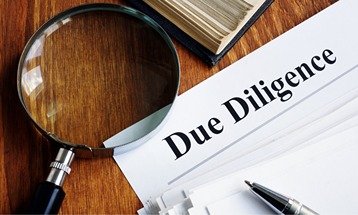
When it comes to buying property in Bangkok, it is important to be aware of the legal process and requirements. The process can be complex, and it is important to work with a reputable lawyer or real estate agent who can guide you through it.
- Due Diligence: The first step in buying property in Bangkok is to conduct due diligence on the property. This includes checking for any legal issues or encumbrances on the property, such as outstanding debts or liens. It is also important to make sure that the property is registered and has a clear title.
- Purchase Agreement: Once you have found a property that meets your needs, the next step is to sign a purchase agreement. This is a legally binding document that outlines the terms and conditions of the sale, including the purchase price and any contingencies.
- Transfer of Ownership: After the purchase agreement is signed, the next step is to transfer ownership of the property. This is done by registering the property in the new owner’s name at the local land office and paying the transfer fee.
- Foreign Ownership Restrictions: It’s important to note that there are restrictions on foreign property ownership in Thailand. Foreigners are not permitted to own land, but can own a building on the land. It is also important to note that there are restrictions on the amount of land that can be owned by foreigners in certain areas.
- Legal and Tax Implications: Buying property in Bangkok also comes with legal and tax implications. it’s important to be aware of the laws and regulations regarding property ownership and taxes in Thailand, and to work with a reputable lawyer or real estate agent who can guide you through the process.
In conclusion, the legal process of buying property in Bangkok can be complex, and it is important to be aware of the requirements and restrictions on foreign property ownership. It is also important to work with a reputable lawyer or real estate agent who can guide you through the process and ensure that your investment is protected. Additionally, it’s also important to be aware of the legal and tax implications of property ownership in Thailand.
Finding the Right Location: Popular Neighborhoods and Communities

One of the most important factors to consider when buying property in Bangkok is the location. Different neighborhoods and communities offer different lifestyles, amenities, and atmospheres. Here are some popular neighborhoods and communities that are popular among expats in Bangkok:
- Sukhumvit: This is a bustling, cosmopolitan neighborhood that is popular among expats working in the financial and business sectors. Sukhumvit is known for its luxury high-rise condos, international restaurants, and high-end shopping. It is also well-connected to public transportation, making it easy to get around the city.
- Silom: This is a financial and business district that is popular among expats working in the financial and business sectors. Silom is known for its modern high-rise condos and apartments, as well as its international restaurants, and high-end shopping.
- Thonglor: This is a trendy neighborhood known for its trendy restaurants, bars and nightlife. This neighborhood is popular among expats looking for a more urban lifestyle and is known for its high-end condos, apartments, and houses.
- Sathorn: This is a residential neighborhood that is popular among expats looking for a quieter, more suburban lifestyle. Sathorn is known for its luxury high-rise condos, international restaurants, and high-end shopping.
- Ratchadamri: This is a upscale neighborhood known for its luxury high-rise condos, international restaurants, and high-end shopping. This neighborhood is popular among expats looking for a more upscale lifestyle and is known for its proximity to the city center.
- Phra Khanong: This is a neighborhood that is popular among expats looking for a more affordable and local lifestyle. Phra Khanong is known for its local shops and street food.
It is important to note that location is a personal preference and it’s important to consider your lifestyle and budget when choosing the right location in Bangkok. It’s also important to consider the proximity of the property to public transportation, shopping, and other amenities.
Tips for Securing the Best Deal on Your Dream Home

- Hire a reputable real estate agent: A good real estate agent can help you navigate the property market, find the best deals and negotiate on your behalf. They also have access to properties that are not listed on the market and can provide you with valuable advice on the current market conditions.
- Research the market: It’s important to research the property market before making an offer. Look at comparable properties in the area and consider factors such as location, size, and condition of the property.
- Be prepared to negotiate: When buying property in Bangkok, it is important to be prepared to negotiate. The initial asking price is often not the final price, and it is important to be able to negotiate a fair price for the property.
- Consider the long-term: When buying property in Bangkok, it is important to consider the long-term. Think about how you will use the property and whether it will meet your needs in the future.
- Look out for additional costs: Be aware of additional costs such as transfer fees, stamp duty, and legal fees. These costs can add up and it’s important to factor them into your budget.
- Get a home inspection: Before purchasing a property, it’s important to get a home inspection to ensure that the property is in good condition. This can help you avoid any unexpected repairs and can also be used as leverage during the negotiation process.
- Be flexible: Be flexible in your search, and consider properties that may not be your first choice. Sometimes, the perfect property may not be on the market, and you may have to be willing to look at other options.
By following these tips, you can increase your chances of securing the best deal on your dream home in Bangkok. It’s important to be patient, do your research, and be prepared to negotiate. Additionally, having a reputable real estate agent can help you navigate the property market and find the best deal.
Finding and Working with a Real Estate Agent or Broker

When buying property in Bangkok, it can be beneficial to work with a real estate agent or broker. They can help you navigate the property market, find the best deals, and negotiate on your behalf. Here are some tips for finding and working with a real estate agent or broker:
- Do your research: Look for a reputable and experienced real estate agent or broker. You can ask for recommendations from friends or colleagues, or search online for real estate agents or brokers who specialize in the area where you are looking to buy property.
- Check credentials: Make sure the real estate agent or broker is licensed and has the necessary credentials. In Thailand, all real estate agents and brokers must be licensed by the Department of Land and be members of the Real Estate Broker Association of Thailand (REBA).
- Communicate your needs: Make sure to communicate your needs and preferences to the real estate agent or broker. This will help them find properties that meet your requirements.
- Ask for references: Ask the real estate agent or broker for references from previous clients to get an idea of their experience and reputation.
- Be upfront about your budget: Be upfront about your budget with the real estate agent or broker. This will help them find properties that fit within your budget.
- Be prepared to work with multiple agents: Be prepared to work with multiple agents or brokers. Each agent or broker may have access to different properties and it’s important to have a wide range of options to choose from.
- Be prepared to sign a buyer’s agency agreement: Be prepared to sign a buyer’s agency agreement with the real estate agent or broker. This agreement outlines the terms and conditions of working with the agent or broker.
Working with a reputable and experienced real estate agent or broker can save you time, money, and stress when buying property in Bangkok. They have access to properties that are not listed on the market and can provide you with valuable advice on the current market conditions. Additionally, they can help you navigate the legal process of buying property and can help you find the best deals.
Financing and Budgeting for Your Bangkok Property Purchase

When buying property in Bangkok, it’s important to consider the cost of financing and budget accordingly. Here are some tips for financing and budgeting for your Bangkok property purchase:
- Get pre-approved for a mortgage: Before you start looking for a property, it’s a good idea to get pre-approved for a mortgage. This will give you an idea of how much you can afford to spend on a property and can also help you when negotiating with sellers.
- Consider additional costs: When budgeting for your Bangkok property purchase, it’s important to consider additional costs such as transfer fees, stamp duty, and legal fees. These costs can add up and it’s important to factor them into your budget.
- Look for financing options: There are several financing options available for foreign buyers in Bangkok, such as mortgages from Thai banks, foreign currency loans, and offshore mortgages. It’s important to research these options and find the one that best suits your needs and budget.
- Consider property type: The type of property you want to buy can also affect the cost of financing. For example, a condominium may be more affordable than a single-family home, and a leasehold property may be more affordable than a freehold property.
- Be prepared to negotiate: Be prepared to negotiate with sellers and real estate agents when buying property in Bangkok. The initial asking price is often not the final price, and it’s important to be able to negotiate a fair price for the property.
- Have a contingency plan: It’s important to have a contingency plan in case something goes wrong during the buying process. For example, if your mortgage application is denied or if you are unable to secure a good deal on a property.
By budgeting and financing correctly, you can ensure that you can afford your dream home in Bangkok. It’s important to consider all the costs involved in buying a property and to research financing options. Additionally, being prepared to negotiate and having a contingency plan can help you to secure the best deal on your dream home.
Rental options and considerations for expats

For expats moving to Bangkok, renting a property can be a good option before committing to buying a property. Here are some rental options and considerations for expats:
- Short-term rentals: Short-term rentals such as serviced apartments, guesthouses, and hostels can be a good option for expats who are new to Bangkok and want to explore different neighborhoods before committing to a long-term rental.
- Long-term rentals: Long-term rentals such as apartments, condominiums, and houses can be a more cost-effective option for expats who plan to stay in Bangkok for a longer period of time.
- Furnished or unfurnished: When looking for a rental, expats should consider whether they want a furnished or unfurnished property. Furnished properties can be more expensive but can save expats the cost and hassle of buying furniture.
- Renting through a property management company: Expats can also consider renting through a property management company. These companies will handle the paperwork and communicate with landlords on behalf of the tenant.
- Location: When looking for a rental, expats should consider the location of the property. Popular neighborhoods for expats include Sukhumvit, Sathorn, and Silom.
- Lease terms: Expats should also consider the lease terms when renting a property. In Thailand, leases can range from 6 months to 3 years. It’s important to read the lease carefully and understand the terms and conditions before signing.
- Cost: Rental prices in Bangkok can vary depending on location, size, and amenities. Expats should budget accordingly and consider the cost of utilities, internet, and other bills.
- Legal requirements: Expats should also be aware of the legal requirements for renting a property in Bangkok. A valid passport and proof of income is typically required.
By considering these options and considerations, expats can find a rental property that suits their needs and budget. It’s important to research different neighborhoods, consider the cost, and understand the legal requirements for renting a property in Bangkok. Additionally, working with a property management company or a real estate agent can make the process of finding a rental property in Bangkok easier.
Maintenance and management of your property
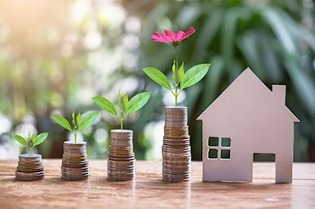
Once you have found your dream home in Bangkok, it’s important to ensure that it is well-maintained and properly managed. Here are some tips for maintenance and management of your property:
- Regular maintenance: Regular maintenance such as cleaning, pest control, and landscaping can help to keep your property in good condition and prevent larger, more costly repairs in the future.
- Hire a property management company: Hiring a property management company can help to take care of the day-to-day management of your property, including collecting rent, handling repairs, and communicating with tenants.
- Have an emergency plan: Having an emergency plan in place can help to minimize the impact of unforeseen events, such as natural disasters or power outages.
- Understand local laws and regulations: It’s important to understand the local laws and regulations regarding property maintenance and management in Bangkok. This includes understanding the regulations for repairs and renovations, and the responsibilities of landlords and tenants.
- Know your rights and responsibilities: As a property owner, it’s important to know your rights and responsibilities in terms of maintenance and management. This includes understanding the terms of your lease or rental agreement and knowing how to handle disputes.
- Keep records and documentations: Keep records of all repairs, maintenance, and management expenses, so that you can budget for them in the future and also to provide evidence if needed.
By ensuring regular maintenance and proper management of your property, you can protect your investment and ensure that your property remains in good condition. Hiring a property management company, having an emergency plan, understanding local laws and regulations, and keeping records and documentations can help to make the process of maintaining and managing your property in Bangkok as smooth as possible.
Tax implications and regulations for foreign property ownership
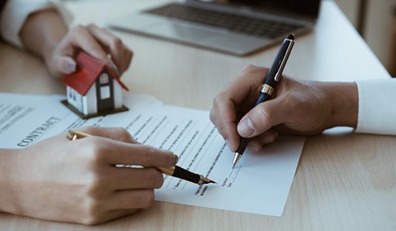
When buying a property in Bangkok, it’s important to understand the tax implications and regulations for foreign property ownership. By understanding the tax implications and regulations for foreign property ownership in Bangkok, you can make an informed decision and budget accordingly. Hiring a lawyer can help to ensure that the process of buying a property in Bangkok is completed legally and smoothly. Additionally, it is important to check if there is any Double Taxation Agreement signed between your country and Thailand to avoid or reduce tax liabilities.
Regulations for foreign property ownership
Foreign Quota:
The foreign quota for property ownership in Bangkok refers to the percentage of ownership that a foreign individual or company can have in a property. In Bangkok, the foreign quota is set at 49%, which means that 51% of the property must be owned by a Thai national. This is a restriction put in place by the Thai government to ensure that Thai citizens maintain a controlling stake in the property market.
If a foreign individual or company wants to purchase a property in Bangkok, they must enter into a co-ownership agreement with a Thai national. This means that the foreign buyer will own 49% of the property and the Thai national will own the remaining 51%. The Thai national is typically a nominee or a trustee who holds the property on behalf of the foreign buyer. The foreign buyer will have the right to use and manage the property, but the Thai national will have the legal ownership of the property.
It’s important to note that this restriction applies to ownership of land only, not condominiums. Foreigners are allowed to own condominiums in their own names without the need for a Thai nominee.
In addition to the foreign quota, foreign property buyers in Bangkok must also comply with other regulations such as obtaining a valid passport and proof of income, having a Thai bank account and registering for a tax identification number (TIN). It’s also important to hire a lawyer to handle the legal process of buying property in Bangkok, to ensure that all necessary documents are in order and that the property is legally transferred.
Land ownership
Land ownership in Thailand is regulated by the Thai Land Code, which states that foreigners are not permitted to own land in the country. This means that foreign individuals or companies cannot purchase land outright and must instead enter into a long-term lease agreement with the option to renew the lease.
The most common type of lease agreement for foreigners is a 30-year lease with the option to renew for an additional 30 years. This means that the foreign individual or company will have the right to use and manage the land for a total of 60 years. During the lease period, the foreign lessee is responsible for paying property taxes and maintaining the land.
It’s important to note that even though foreigners cannot own land in Thailand, they can still build on it. This means that a foreign lessee can construct a building or a house on the leased land and have full control over it. Additionally, the property can be sold or transferred to another foreign lessee.
However, it’s important to be aware that there are some restrictions on the use of land by foreign lessees. For example, land in certain areas may be designated for agricultural use only and cannot be used for commercial or residential purposes. Also, the land cannot be used for any activity that may be detrimental to the national security or cause harm to the environment.
To enter into a lease agreement, foreign buyers must have a valid passport and proof of income, have a Thai bank account and register for a tax identification number (TIN). It’s also important to hire a lawyer to handle the legal process of leasing land in Thailand, to ensure that all necessary documents are in order and that the lease agreement is legally binding.
Property purchase process
The property purchase process for foreigners in Bangkok can be a bit more complex than for Thai citizens. There are several requirements that foreign buyers must meet before they can purchase a property.
The first requirement is that foreign buyers must have a valid passport. This is to prove their identity and citizenship. They also need to have proof of income, such as a salary statement or tax return, to demonstrate their financial capability to purchase the property.
The second requirement is that foreign buyers must have a Thai bank account. This is necessary for the transfer of funds and for the payment of property taxes. It’s also important to note that Thai banks may require a minimum deposit and may only accept funds transferred from foreign banks in certain currency.
The third requirement is that foreign buyers must register for a tax identification number (TIN) before purchasing a property. The TIN is a unique identification number issued by the Thai government and is required for all transactions involving property in Thailand, including buying, selling and renting.
Once these requirements have been met, the foreign buyer can proceed with the property purchase process. This typically involves hiring a lawyer to handle the legal process and to ensure that all necessary documents are in order. Some of the key documents required include a sales and purchase agreement, a title deed, and a building permit.
It’s important to note that the property purchase process can take several months to complete and may require multiple trips to Thailand. Also, if the property is being purchased in a company name, the company must be at least 51% Thai-owned and the foreign buyer must have proper work permit and visa.
It’s also worth mentioning that, in addition to the legal process, foreign buyers should also consider factors such as location, budget, and lifestyle when buying property in Bangkok. It’s always recommended to engage with a real estate agent who is well-versed in the local market and regulations, to help make the process as smooth as possible.
Taxes
Taxes are an important consideration for foreign property owners in Bangkok. The taxes that they are subject to include personal income tax, transfer fee, and stamp duty.
Personal income tax is based on the annual rental income earned from the property. The tax rate is progressive, starting at 10% for rental income up to 150,000 THB and increasing to 37% for rental income over 4,500,000 THB.
The transfer fee is a tax that is imposed on the transfer of ownership of a property. The fee is calculated as a percentage of the sale price of the property, and varies depending on the value of the property. For example, for a property valued at less than 1,500,000 THB, the transfer fee is 2% of the sale price. For a property valued at more than 40,000,000 THB, the transfer fee is 3.3% of the sale price.
Stamp duty is a tax that is imposed on the transfer of ownership of a property. The fee is calculated as a percentage of the sale price of the property, and varies depending on the value of the property. For example, for a property valued at less than 1,500,000 THB, the stamp duty is 0.5% of the sale price. For a property valued at more than 40,000,000 THB, the stamp duty is 1.5% of the sale price.
It’s important to note that the taxes and fees mentioned above are the standard taxes that foreign property owners in Bangkok are subject to. Depending on the specific circumstances of the property purchase, additional taxes and fees may also apply. It’s always recommended to consult with a lawyer or tax professional to ensure that you fully understand the tax implications of buying property in Bangkok.
In addition, foreign property owners should also be aware of the annual property tax which is based on the value of the property and is levied on the land or building and paid to the local government.
It’s also important to keep in mind that taxes laws and regulations are subject to change, and it’s always best to consult with a tax professional or lawyer to ensure that you have the most up-to-date information and that you are in compliance with all relevant tax laws.
Condominium ownership
Condominium ownership is a popular option for foreign buyers in Bangkok, as it does not fall under the foreign quota regulation. However, it is important to note that there is a requirement for 51% of the units in the building to be owned by Thai nationals. This means that only 49% of the units in the building can be owned by foreign individuals or companies.
When purchasing a condominium unit, foreign buyers will need to provide proof of income and a valid passport, and will also need to have a Thai bank account and register for a tax identification number (TIN) before the purchase can be completed.
In addition, foreign buyers should also be aware of the condominium act, which regulates the ownership and management of condominiums in Thailand. The act includes regulations for the registration of condominiums, the rights and responsibilities of unit owners, and the management and maintenance of the condominium building.
It’s important to note that condominium ownership in Bangkok is different from owning a house or a land, Condominium ownership only gives you the right to use and possess the unit you bought and not the land it is built on.
It’s also worth consulting with a lawyer or real estate agent who is familiar with the condominium market in Bangkok and can advise on the process of purchasing a condominium unit, as well as the laws and regulations that apply to condominium ownership in Thailand.
Legal representation
Hiring a lawyer to handle the legal process of buying property in Bangkok is highly recommended for foreigners. A lawyer can ensure that all necessary documents are in order and that the property is legally transferred. They can also advise on the laws and regulations that apply to foreign property ownership in Thailand, and can help to navigate the complex legal process of buying property in Bangkok.
A good lawyer will also be able to provide guidance on the legal aspects of co-ownership agreements, long-term lease agreements and the condominium act, as well as any other laws and regulations that may apply to the specific property you are interested in.
The legal process of buying property in Bangkok can be a time-consuming and complex process, and it’s important to have a lawyer who is experienced in dealing with property transactions in Thailand to handle the legal aspects of the purchase. This will help to minimize the risks and ensure that the process goes smoothly.
It is also worth noting that a lawyer will be able to review the property title and make sure it’s clear and free of any liens or legal encumbrances, this will avoid any future legal issues.
In summary, hiring a lawyer for representation during the property purchase process in Bangkok is a wise decision, it will provide you with the necessary guidance and protection to ensure the process is completed smoothly and legally.
Tax implications
When buying property in Bangkok, it’s important to understand the tax implications associated with the purchase. Here are some key tax considerations for property buyers in Bangkok:
- Personal income tax: Foreigners who own property in Bangkok are subject to personal income tax on rental income generated by the property. The tax rate ranges between 5-35% depending on the income level.
- Transfer fee: A transfer fee of 2% of the property’s value is required when transferring ownership of a property in Bangkok. This fee is paid by the buyer.
- Stamp duty: A stamp duty fee of 0.5% of the property’s value is required when registering the transfer of ownership. This fee is also paid by the buyer.
- Property tax: Property owners in Bangkok are subject to annual property taxes, which are based on the value of the property. The tax rate ranges between 0.1-0.3% of the property value.
- Capital gains tax: When a property is sold, a capital gains tax of 15% is applied on the profit made from the sale.
- Withholding tax: The rental income earned from the property is subject to withholding tax of 10%.
It’s important for property buyers to take these taxes into account when budgeting for a property purchase in Bangkok. Consulting a tax professional or a lawyer can help to ensure that all tax obligations are met and that the property purchase process goes smoothly.
It is important to note that the tax laws in Thailand are subject to change, and it’s always best to consult a tax professional or lawyer to ensure that the most up-to-date information is being considered.
Common challenges and pitfalls to avoid in the Bangkok property market
The Bangkok property market can be complex and challenging, especially for expats. Here are some common challenges and pitfalls to avoid:
- Language barrier: The language barrier can be a challenge when buying a property in Bangkok. It’s important to have a translator or a bilingual agent to help you understand the legal documents and communication with the seller.
- Scams and fraud: Be aware of scams and fraud in the Bangkok property market. Always use a reputable real estate agent or lawyer and make sure to verify the ownership of the property before buying.
- Hidden costs: There may be additional costs associated with buying a property in Bangkok, such as transfer fees, stamp duty, and taxes. Make sure to budget for these costs and understand them before making a purchase.
- Financing: Financing can be a challenge for expats in Bangkok. Make sure you understand the options available to you and that you have a good credit score, as it can affect your ability to get a loan.
- Property condition: Before buying a property in Bangkok, it’s important to have it inspected by a professional to ensure that it is in good condition. This can help to avoid any hidden problems or costly repairs.
- Cultural differences: Cultural differences can also be a challenge when buying a property in Bangkok. It’s important to be respectful of local customs and laws, and to have a good understanding of the local property market.
By being aware of these common challenges and pitfalls, you can make a more informed decision when buying a property in Bangkok. Hiring a reputable real estate agent or lawyer, budgeting for hidden costs, understanding your financing options, and having a property inspected, can help to ensure that the process of buying a property in Bangkok is as smooth as possible. Additionally, it is important to be respectful of local customs and laws, and to have a good understanding of the local property market.
Resources and support networks for expat property buyers in Bangkok

When buying a property in Bangkok, it’s important to have access to resources and support networks to help you navigate the process. Here are some options to consider:
- Real estate agents and brokers: Real estate agents and brokers are a valuable resource for expat property buyers in Bangkok. They can help you find properties that meet your needs, navigate the legal process, and negotiate deals.
- Lawyers: Lawyers can help you understand the legal and tax implications of buying a property in Bangkok. They can also assist with the property transfer and ensure that the process is completed legally and smoothly.
- Expat groups and forums: Expat groups and forums can be a great resource for information and support. They can provide valuable insights into the Bangkok property market and connect you with other expats who have gone through the process of buying a property.
- Embassies and consulates: Embassies and consulates can provide information and assistance on the legal and tax implications of buying a property in Bangkok. They can also help to connect you with local resources and support networks.
- Online resources: There are many online resources available for expat property buyers in Bangkok, such as property listings and forums. These can be a great way to research properties, learn about the market, and connect with other expats.
- Local property management companies: In case you decide to rent out your property, local property management companies can assist you in managing your property, finding tenants, and handling repairs and maintenance.
By utilizing these resources and support networks, expat property buyers in Bangkok can have a better understanding of the process, navigate the legal and tax implications, and connect with other expats who have gone through the process of buying a property. Using local property management companies can also assist in managing and renting out your property.
The future of the Bangkok property market and potential investment opportunities

The Bangkok property market has been growing steadily in recent years and is expected to continue to do so in the future. Here are some potential investment opportunities in the Bangkok property market:
- Tourism: Bangkok is a popular tourist destination and the tourism industry is expected to continue to grow in the future. Investing in properties in tourist areas such as Siam, Sukhumvit, and Silom can be a good opportunity to capitalize on the growing tourism industry.
- Infrastructure: The government is investing in infrastructure projects such as the high-speed rail link and the expansion of the subway system. These projects are expected to increase property values in areas that are well-connected to transportation.
- Affordable housing: The government is also investing in affordable housing projects to address the housing shortage in Bangkok. Investing in these projects can provide good returns in the long term.
- Rental properties: With a growing expat community in Bangkok, rental properties can be a good investment opportunity. Properties in popular expat neighborhoods such as Thonglor, Ekkamai, and Phrom Phong can be in high demand.
- Luxury properties: The luxury property market in Bangkok has been growing in recent years, with an increase in demand for high-end properties in prime locations such as Sathorn, Sukhumvit, and Riverside.
- Commercial properties: With the growing economy, commercial properties such as office buildings and shopping centers in Bangkok can also be a good investment opportunity.
It’s important to note that any investment carries risk. Before making any investment decisions, it’s important to conduct thorough research and consult with a financial advisor. Additionally, the COVID-19 pandemic has affected many industries, including the property market, and it’s important to consider how the pandemic may impact the market before making any investment decisions.
Frequently Asked Questions and additional information for expats in the Bangkok property market
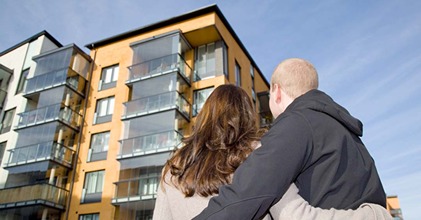
- What are the legal requirements for foreigners to buy property in Bangkok?
Foreigners are allowed to buy property in Thailand, but there are restrictions on the type of property that can be purchased. Foreigners are not allowed to own land, but they can own condominiums and leasehold property. To buy a condominium, foreigners must have a valid passport and a valid Thai visa. It’s also important to consult with a lawyer to ensure that the legal process is completed correctly.
- What are the costs associated with buying a property in Bangkok?
The costs associated with buying a property in Bangkok include a transfer fee, stamp duty, and legal fees. The transfer fee is typically 2% of the property value and the stamp duty is 0.5%. Legal fees can vary depending on the lawyer. It’s important to budget for these costs and consult with a lawyer to understand the costs associated with the legal process.
- How do I find the right location for my property in Bangkok?
Finding the right location for your property in Bangkok can be challenging. It’s important to consider factors such as proximity to transportation, schools, and shopping centers. Popular neighborhoods and communities for expats include Thonglor, Ekkamai, and Phrom Phong. It’s also important to consult with a real estate agent or broker to find properties that meet your needs.
- Can I rent out my property in Bangkok?
Yes, you can rent out your property in Bangkok. However, it’s important to understand the legal and tax implications of renting out your property. It’s also important to consult with a property management company to handle the maintenance and management of your property.
- What are the tax implications of owning property in Bangkok?
Owning property in Bangkok can have tax implications. It’s important to consult with a lawyer and a tax advisor to understand the tax implications of owning property in Bangkok.
- Are there any additional resources or support networks for expat property buyers in Bangkok?
Yes, there are many resources and support networks for expat property buyers in Bangkok. Expat groups and forums, embassies and consulates, and online resources can provide valuable information and support. Additionally, local property management companies can assist with managing and renting out your property.
In conclusion, buying a property in Bangkok can be a complex process, but with the help of the right resources and support networks, it can be a rewarding experience. It’s important to understand the legal, tax, and financial implications of buying a property in Bangkok, conduct thorough research, and consult with professionals before making any decisions.
Conclusion and Next Steps for Expats in the Bangkok Property Market
The Bangkok property market offers a wide range of options for expats looking to purchase a home. From understanding the different types of properties available to navigating the legal process, there are many factors to consider when buying a property in Bangkok. However, with the right resources and support networks, expats can find their dream home and make a sound investment.
When looking to buy a property in Bangkok, it’s important to:
- Understand the legal and financial implications of buying property in Bangkok
- Research popular neighborhoods and communities that align with your needs and preferences
- Seek guidance from a reputable real estate agent or broker
- Consult with a lawyer and tax advisor to understand the tax implications of owning property in Bangkok
Once you have found the right property, the next step is to secure financing and budget accordingly. It’s also important to understand the process of renting out your property and the tax implications of renting.
In conclusion, owning property in Bangkok can be a rewarding experience, but it’s important to do your due diligence and seek guidance from professionals. With the right resources and support networks, expats can navigate the Bangkok property market and find their dream home.
Are you planning a move to Bangkok as an expat? Our comprehensive guide has all the information you need to make the transition smooth and successful. First, our “Best Places to Live in Bangkok” neighborhood guide offers a detailed look at the city’s top areas for expats, including information on nightlife, transportation, and safety. Next, “Understanding the Current State of Crime in Bangkok” provides an in-depth analysis of the city’s crime rate and safety concerns, as well as tips on how to stay safe while living in Bangkok. Lastly, our “Bangkok Expat Guide” covers all the basics of relocating to Bangkok, from visa requirements to housing options, cultural customs, healthcare and more. Make your move to Bangkok with confidence by reading our guides first!
